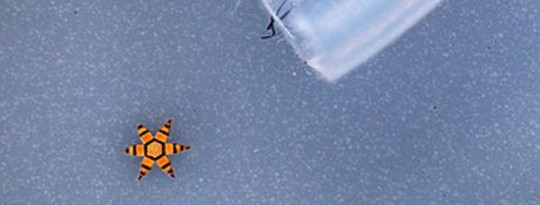
Researchers designed and tested star-shaped microtools that close in response to body heat to grasp tissue samples. The microgrippers, which require no wires or power, can potentially be used to retrieve tissue samples in many hard-to-reach places.
Samples of tissue are often removed in a procedure known as a biopsy to help diagnose medical conditions such cancer. Tissues are typically collected with a needle attached to a syringe or by making a small cut to surgically access the area. For a large organ, such as the colon, it can be difficult to collect enough samples to cover the full region. For example, in patients with ulcerative colitis who are screened for colon cancer, the standard is to collect about 30 samples. Unfortunately, this large number represents well under 1% of the colon lining and could miss a precancerous or cancerous lesion.
A team led by Drs. David H. Gracias and Florin M. Selaru from Johns Hopkins University set out to develop a better tool to collect tissue samples. Their research was funded in part by an NIH Director’s New Innovator Award and by NIH’s National Institute of Diabetes and Digestive and Kidney Diseases (NIDDK).
The researchers fabricated star-shaped microtools of about 300 microns to 1. 5 millimeters in size by applying some of the methods used for making computer chips. These tools were 10 to 100 times smaller than conventional biopsy forceps—small enough to pass through a catheter tip but large enough to be seen by conventional imaging methods.
Get The Latest By Email
The scientists used rigid magnetic nickel for the arms to allow the microtools to be guided by magnetic fields. A pre-stressed bilayer of gold and chromium formed hinges. Another layer of polymer was designed to be rigid at cold temperatures, keeping the star-shaped tool flat and open. At body temperature, this layer softened to allow the points of the star to hinge closed and grasp tissue.
Earlier this year, the researchers reported using the microgrippers to remove tiny samples from the bile ducts of living pigs. In the latest study, the scientists used the technique to obtain biopsies across large regions of the pig colon as well as the esophagus.
Using an endoscope, the researchers injected 150-1,500 microgrippers and monitored them with a camera. The grippers closed within 5-10 minutes in response to the warm body temperature, capturing pieces of tissue. The researchers retrieved the microgrippers by inserting a catheter with a magnetic tip. The resulting tissue samples contained clusters of intact cells suitable for analysis.
Based on a small sample, you can’t always draw accurate inferences,” says Selaru. We could deploy hundreds or even thousands of these grippers to get more samples and a better idea of what kind of or whether a disease is present.
Since they are powered by the stress built into them, the microgrippers don’t require a tether or wire to deliver energy. In addition, different polymers could allow for the tool to be triggered by a range of temperatures, chemicals and enzymes.
The researchers note that methods to retrieve the microgrippers will need to be improved to ensure they are all removed from the body. Alternatively, they might be made of biodegradable materials to eliminate potential health risks. Article Source: NIH Research Matters










